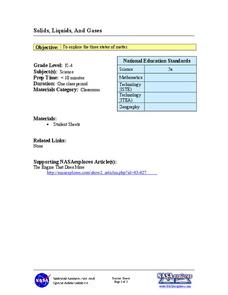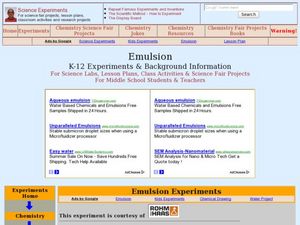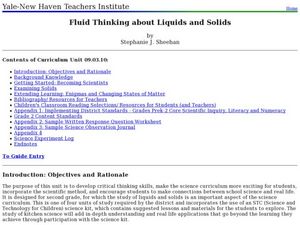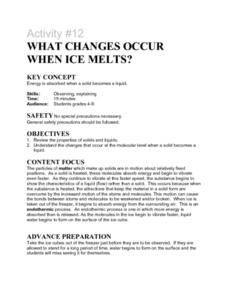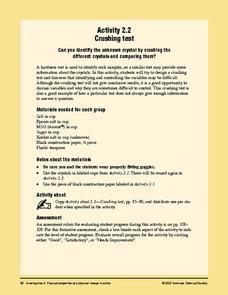Prestwick House
Vocabulary Lesson
Vocabulary instruction works best when taught within a larger context. A vocabulary activity builds connections by using synonyms to help learn the meaning of new words. This helps connect the words to prior knowledge and give them context.
Curated OER
Activity Log- Heart Power
In this health and fitness worksheet, students keep a detailed log on this blank chart. Students record all their fitness activities for a week and indicate if they are aerobic or anaerobic.
Curated OER
Money Matters
Students practice spending money by completing math word sentences. In this economics lesson, students utilize problem solving strategies to complete word problems written on the board involving making purchases with money. Students...
Curated OER
Succession in the Classroom
Middle schoolers investigate their environment by growing plants in class. In this botany lesson, students discuss the lifespan of plants and animals and how they must be cared for continuously over time. Middle schoolers grow a plant...
Curated OER
Chemical Change
Fifth graders watch a demonstration in which a balloon is inflated using the gas created by combining vinegar and baking soda. Then, in groups, they combine various assigned substances and watch and record the results.
Curated OER
What is an Atom?
Third graders understand that the smallest particle is an atom. In this matter lesson, 3rd graders make a piece of aluminum smaller and smaller to see that what's left is still aluminum. Students recognize that cutting into smaller...
Curated OER
Solids, Liquids, and Gases
Students investigate and explore the three states of matter. They read and discuss the NASA article "The Engine That Does More," identify examples of each state of matter, and as a class complete a section of two worksheets. They...
Curated OER
Emulsions
Students identify the characteristics and composition of emulsions. In this chemistry lesson, students classify household products according to emulsion type. They explain how to make the best emulsion.
Curated OER
Fluid Thinking About Liquids and Solids
Second graders examine the physical characteristics of the different states of matter. For this chemistry lesson, 2nd graders observe how matter changes from one phase to another. They classify substances according to its type of matter.
Curated OER
What's the Matter with My Snow?
Students collect snow samples around their school. They explore the concepts of density and phase change as well as the math skills of measurement and statistics. Students explore the water cycle through an interactive, down loadable...
Curated OER
SAFETY KNOWLEDGE BASE CHANGES
Middle schoolers research and formulate a hypothesis for research to correlate changing safety regulations in regards to personal and environmental safety polices for storage, handling and disposal of chemicals, risk involved in...
Curated OER
Convection Activities
Students conduct a series of hands-on activities to demonstrate that heated air expands and that warm air rises because it is less dense.
Curated OER
Warming by Freezing
Ninth graders discover the reasoning behind spraying water on fruit and seedlings in preparation for hard freezes. In this conceptual physics lesson plan, 9th graders conduct an experiment to measure the heat released when water goes...
Curated OER
Snack Attack: Food Packaging Activity
Learners design and create packaging material for food. For this snack attack lesson, students design a package to protect a food item from heat and water. Learners consider costs of materials, design, and test the package to see if it...
Curated OER
Matter
Students complete a unit of activities to learn about states of matter and how to measure matter. In this matter activity, students complete 8 lessons to learn about matter, its states, and how to measure matter.
Curated OER
Activity #6 'Nothing' Matters: A Demonstration
Students observe the 'pouring' of a gas. They compare the masses (weights) and densities of two gases. Pupils define the following terms: matter, mass, and density. Students answer questions after watching the demonstration.
Curated OER
What Changes Occur When Ice Melts?
Students explore the physical process of melting. They observe melting ice and answer questions related to energy transfer during phase changes.
Discovery Education
Cool It!
Adjust the melting time of ice without varying the temperature! Learners experiment with different materials to decide how the materials affect the rate an ice cube melts. They then connect their findings to the conductivity of each...
Chicago Botanic Garden
Carbon, Greenhouse Gases, and Climate
Climate models mathematically represent the interactions of the atmosphere, oceans, land, sun, surface, and ice. Part two in the series of four lessons looks at the role greenhouse gases play in keeping Earth warm and has participants...
LABScI
Freezing Point Depression: Why Don’t Oceans Freeze?
Can you go ice fishing in the ocean? Learners examine the freezing point of different saltwater solutions. Each solution has a different concentration of salt. By comparing the freezing points graphically, they make conclusions about...
Curated OER
Mass vs. Weight
Why do you weigh more in space? Each individual in your class explores this question and others as they determine the mass and weight of different objects using two types of scales. They perform conversions and discuss their results,...
Herff Jones Education
Chemical Equations
Allow the class to play the role of "mind reader" as they predict the products of single and double displacement reactions. They also categorize reactions according to each type and balance chemical equations using the conservation of...
University of Colorado
Can Photosynthesis Occur at Saturn?
In the 19th activity of 22, learners determine if distance from a light source affects photosynthesis. Participants capture oxygen in straws and find that the amount of water the gas displaces is proportional to the rate of photosynthesis.
American Chemical Society
Crushing Test
Solidify understanding of the properties of crystals by crushing them to compare hardness. After some class discussion, a procedure is planned, and then small groups go about making observations as they crush five different crystal...








